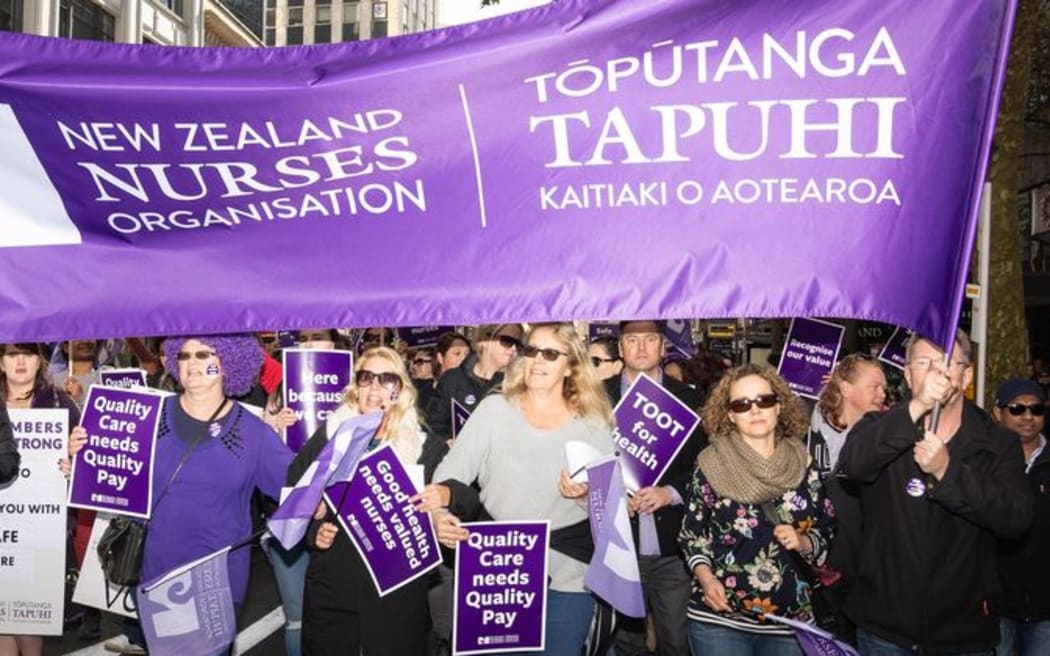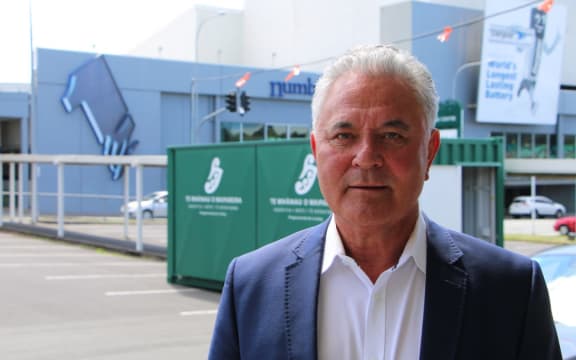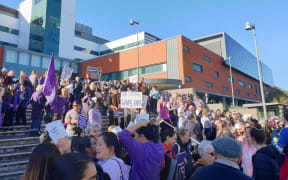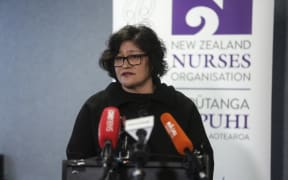
New Zealand Nurses Organisation members have used strikes to advance their demands around pay and conditions. Photo: supplied
The head of a nurses union says a historic gender equity settlement is a great step toward addressing years of discrimination in the sector.
Te Whatu Ora nurses have voted to accept the settlement, which will net some up to $28,000 in lump sums and backpay, but it does not include nurses not employed in the public sector.
New Zealand Nurses Organisation chief executive Paul Goulter told Morning Report the great bulk of nurses were relieved.
"We're pleased that it's been concluded. Some nurses really like it, some nurses don't, and I think the great bulk of them are just relieved it's over.
"It is a major step forward and the government has to take some credit for that. But it really is just the start of a long process."
Te Whatu Ora already paid out lump sums of $10,000 last March, and together with additional lump sums and back pay on the revised pay rates, staff were owed between $17,000 and $29,000, depending on role and seniority.
Senior full-time nurses will earn between $105,704 and $153,060, plus penal rates. Other registered nurses will earn between $69,566 and $99,630 per annum full time, also plus penal rates.
"They deserve every cent of that," Goulter said.
"The senior nurses had a particular problem to do with the fact that they've obviously had long faced discrimination for a longer period of time. So we've worked hard to ensure that there was something additional in there for them."
But nurses not employed directly by Te Whatu Ora were not included in this deal - Goulter noting those employed by Māori and iwi health providers, GPs, aged residential care facilities, Plunket and community health now faced a "massive gap".
"Even though the government did move to close that gap with pay parity payments announced over the last six months, it's suddenly widened again and we're getting lots and lots of employers saying, 'what are we gonna do about it? How are we going to stop that drift of our nurses back into the hospitals?'"
Waipareira Trust chief executive John Tamihere said the government needed to close that gap now.

John Tamihere. Photo: RNZ
"People continue to ... clip our ticket by 20 percent and underfund us as high as 20 percent, it's an unworthy position for us to be placed in," he told RNZ.
"But worse than that, us having to contest it vigourously, annually, is another blight on the system."
Tamihere hoped Te Aka Whai Ora, the new Māori Health Agency, would help cut the pay disparity, which put providers like Waipareira Trust in a "very difficult position".
"We are subject to poaching all the time ... a lot of our people stay with us because they're passionate about the kaupapa and the movement that they're a part of, but at the end of the day they've all got to put food on the table and pay mortgages.
"So any disparity solely because of who you are cannot be tolerated in this country iii we're very good at what we do - we should be compensated equally with other providers, including the state."
Asked why the NZNO signed up to a deal that left so many out, Goulter said they had to "start somewhere".
"Basically, this was the first claim lodged - remember this goes back to 2017, so it's got a lot of history on it. The next steps now are, how do we advance it for groups that aren't directly employed by Te Whatu Ora? Because that's an additional complication."
Health Minister Dr Ayesha Verrall on Monday said the government's efforts had seen more than 8000 new nurses register in 2022, "a 60 percent increase from the previous year".
"This is the second pay rise for nurses in the past nine months - the first being the interim 14 percent pay equity adjustment paid in April this year and backdated to 7 March 2022, and the $10,000 lump sum payment (pro-rated) already part paid," Verrall said.
"I'm pleased Te Whatu Ora and union officials were able to work together to achieve this deal, which has been a long time coming."
Strike still looms
The deal would have no bearing on a potential strike on 9 August, Goulter said.
"The two things are completely separate. The pay equity process is done under the Equal Pay Act, and you can't strike over pay equity processes and that's been made clear in the law. So that's a stream that's now been addressed.
"The other stream is the collective agreement negotiations, and the purpose of those are essentially around things like cost of living, terms and conditions of employment - for example, nurse-patient ratios, which are critical to ensure patient safety and nurse safety - those are the sorts of things that face us now.
"So that's essentially as a forward-facing piece and our members weren't happy with the initial offers from Te Whatu Ora. We've gone back into negotiations, we've got further offers and our members will vote on them starting today.
"And if they vote for that, the strike is off; if they vote against it, the strike is on."





